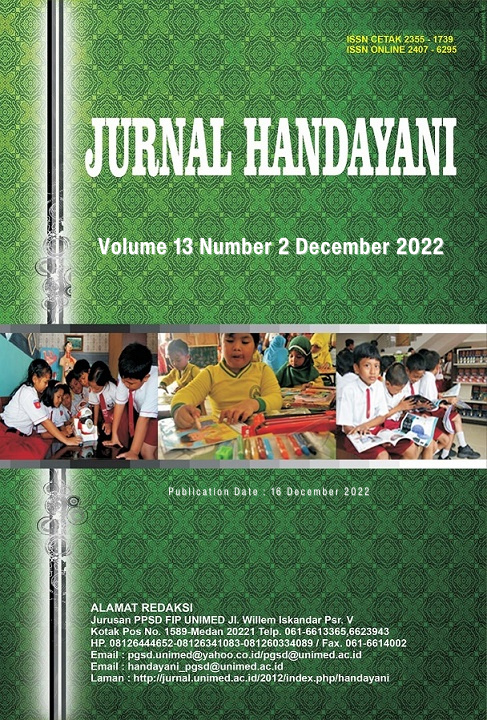Abstract
Abstract: THE EFFECT OF THE KNISLEY INTEGRATED STEAM LEARNING MODEL ON NUMERATIC LITERACY AND LEARNING OUTCOMES IN CLASS IV ELEMENTARY SCHOOL STUDENTS. The research aims are to (1) examine the effect of the Knisley integrated STEAM learning model on the numeracy literacy of fourth grade elementary school students and (2) the effect of the Knisley integrated STEAM learning model on the learning outcomes of fourth grade elementary school students, in mathematics. Experimental method with Quasi-Experimental Design and Nonequevalent Control Group Design. The population was fourth grade students at Kanigoro 03 Public Elementary School. The sample was determined using a purposive sampling technique, and the technique used for data analysis was prerequisite test (1) normality test (2) homogeneity test while hypothesis testing used ANACOVA. The results of the analysis show: first, there is a comparison of the numeracy literacy abilities of students who take classes with the Knisley integrated STEAM learning model versus the face-to-face learning model (lectures). the significance value of the pre-test, post-test of numeracy literacy is 0.000 means (0.00 <0.05), both of which are differences in the ability of cognitive learning outcomes of students who take classes with the Knisley integrated STEAM learning model and the Face-to-face learning model (lectures) value initial significance and learning outcomes that is 0.000 means (0.00 <0.05). Thus, it was found that the Knisley integrated STEAM learning model had an effect on numeracy literacy and fourth grade student learning outcomes.Keywords: STEAM learning model, Knisley learning model, numeracy literacy, learning outcomes.Abstrak: PENGARUH MODEL PEMBELAJARAN STEAM TERINTEGRASI KNISLEY TERHADAP LITERASI NUMERASI DAN HASIL BELAJAR SISWA KELAS IV SEKOLAH DASAR. Penelitian memiliki tujuan guna (1) menguji pengaruh model pembelajaran STEAM terintegrasi Knisley terhadap literasi numerasi siswa kelas IV sekolah dasar dan (2) pengaruh model pembelajaran STEAM terintegrasi Knisley terhadap hasil belajar siswa kelas IV sekolah dasar, dimata pelajaran matematika. Metode ekperimen dengan rancangan Quasi-Eksperimental Design dan desain Nonequevalent Control Group Design. Populasi adalah siswa kelas IV SD Negeri Kanigoro 03. Penetapan sampel memakai teknik sampling purposive, dan teknik yang digunakan untuk analisis data adalah uji prasyarat (1) uji normalitas (2) uji homogenitas sementara itu uji hipotesis menggunakan ANACOVA. Hasil analisis menujukan: pertama, didapati perbandingan kemampuan literasi numerasi siswa yang mengikuti kelas dengan model pembelajaran STEAM terintegrasi Knisley versus model pembelajaran Tatap muka (ceramah). nilai signifikansi pre-test, post-test literasi numerasi yaitu 0,000 berarti (0,00 < 0,05), keduanya merupakan perbedaan kemampuan hasil belajar kognitif siswa yang menggikuti kelas dengan model pembelajaran STEAM terintegrasi Knisley dan model pembelajaran Tatap muka (ceramah) nilai signifikansi awal dan hasil belajar yaitu 0,000 berarti (0,00 < 0,05). Demikian, didapati kesimpulan model pembelajaran STEAM terintegrasi Knisley berpengaruh terhadap literasi numerasi dan hasil belajar siswa kelas IV.Kata Kunci: model pembelajaran STEAM, model pembelajaran Knisley, literasi numerasi, hasil belajar


